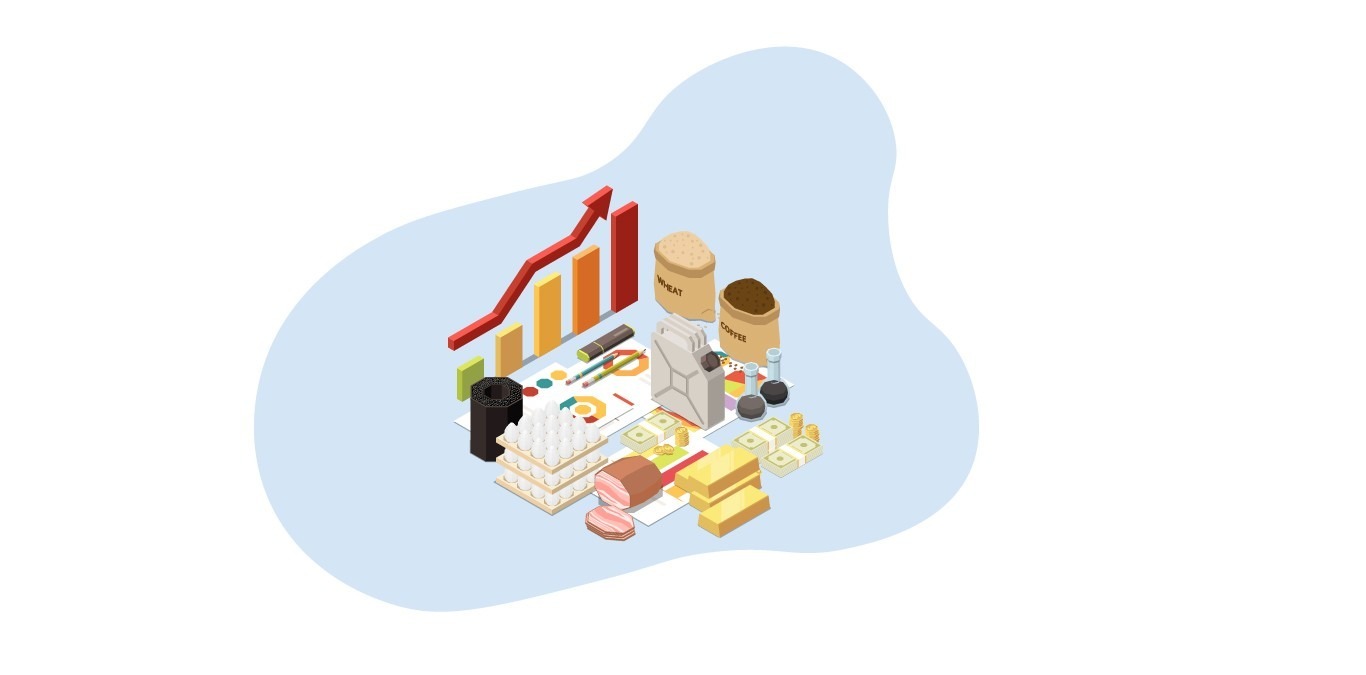In this article let’s take a detailed look at different aspects of commodity trading such as:
What are commodities?
What is commodity trading?
How does commodity trading work?
What are the pros and cons of commodity trading?
What are commodities?
A commodity refers to any basic good used in commerce that can be exchanged with other goods of the same type. Some examples of commodities include grains, pulses, metals, oils, bullions, energy products, etc.
Commodities can be classified into four major categories as listed below:
Metals – Gold, Silver, Platinum, Copper, etc.
Agriculture – Wheat, Rice, Cocoa, Ragi, etc.
Energy – Crude oil, Gasoline, Heating gas, etc.
Livestock & Meat – Eggs, Cattle, etc.
What is commodities trading?
Commodities trading refers to the activity of buying, selling, and trading in commodities.
To start with commodity trading, one requires a trading account and a demat account with a stockbroker as well as a basic understanding of the functioning of the commodities market.
Investing through a futures and options contract is one of the most popular ways to invest in commodities. In simple words, a futures contract refers to an agreement to buy or sell a particular quantity of a commodity at a pre-determined price at a later time. This can be done in every category of commodities. Traders use such contracts as a risk-prevention step towards reducing the risk associated with the price swing of commodities in the future.
Some other methods of investing in commodity include taking physical delivery of the commodity or invest in commodity mutual funds and Exchange-traded funds (ETFs).
Commodity trading in the derivatives segment takes place for 5 days a week except holidays declared by the exchange in advance. The normal market timings for the commodity derivatives segment are from 09:00 hrs to 23:30 hrs.
What are the major commodity trading exchanges in India?
There are 3 major commodity trading exchanges in India such as:
Multi Commodity Exchange – MCX
Established in the year 2003, Multi Commodity Exchange of India is an independent commodity exchange based in India. It is one of India’s largest commodity futures exchanges and is based in Mumbai.
National Commodity and Derivatives Exchange – NCDEX
Incorporated in the year 2003, National Commodity & Derivatives Exchange Limited (NCDEX) is one of India’s leading agricultural commodity exchange in India, offering a broad-based bouquet of commodities including exclusive commodities which are not traded on any other platforms globally such as pulses, spices, and guar.
Indian Commodity Exchange – ICEX
Headquartered in Mumbai, Indian Commodity Exchange Limited (ICEX) is one of India’s leading SEBI regulated online Commodity Derivative Exchange. ICEX offers a nationwide trading platform through its brokers and one of the first exchanges in the world to offer diamond derivative contracts in the year 2018.
What are the advantages and disadvantages of commodity trading?
Advantages of commodity trading
- Commodity trading ensures protection against the sudden increase in prices of commodities.
- It can help in hedging prices against a black swan event which may result in a price hike or deep discount.
- Due to availablity of high leverage in commodities trading, even a small fluctuation in price can create huge profits.
- Commodities can be used as a part of the overall diversification strategy.
Disadvantages of commodity trading
- On one side while high leverage means high profits, it also means high losses in case of unfavorable trades.
- High volatility in commodities means one wrong trade can result in wiping out a trader’s capital too completely.
What are the alternatives to invest in commodities?
Stocks
Instead of investing in commodities, investors can also invest in stocks of companies that are related to those commodities. For example, instead of investing in silver, an investor can invest in the stock of companies that are into mining silver or deals with silver bullions. This strategy of taking an indirect investing route using stocks to enter the commodities market is that trading is highly advisable to investors with limited knowledge of the commodities market. Stocks have higher liquidity and there is a lot of easier information about a company’s financial situation easily available in the public domain.
The Bottom Line
Commodity trading offers a variety of benefits such as a high potential for returns, scope for diversification beyond traditional securities, and a potential hedge against increasing prices.
However, commodity trading can be very risky because the demand and supply in the commodity market are subject to uncertainties that are difficult to predict, such as weather, disasters, and epidemics.
To invest in a portfolio of 20-25 multibagger stocks chosen after detailed research.
Read more: How Long-term investing helps create life-changing wealth – TOI.
How useful was this post?
Click on a star to rate it!
Average rating 0 / 5. Vote count: 0
No votes so far! Be the first to rate this post.

